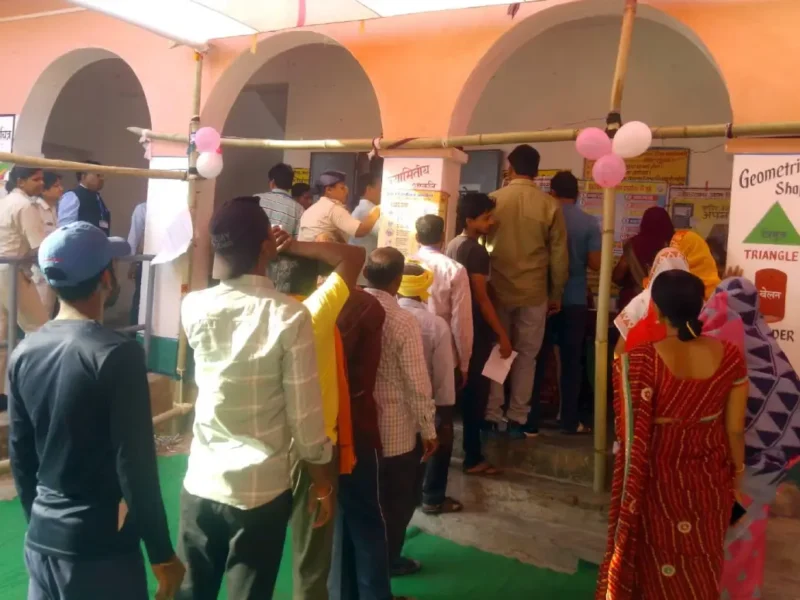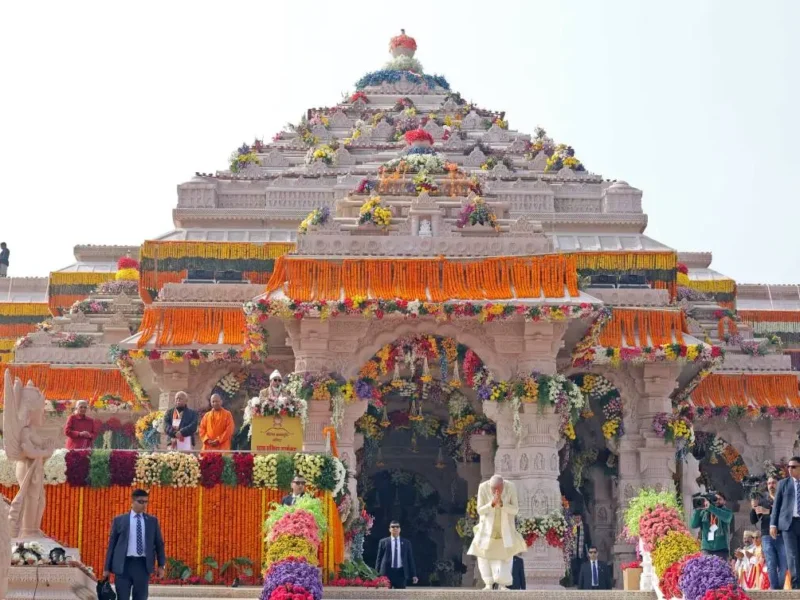Will Governor Newsom Veto SB 403 To Stop The Gaslighting Of Hindus?
From Geeta Sikand, Irvine, CA
We Californians of Hindu Faith are profoundly disappointed and appalled. Despite significant opposition from many Hindu stakeholder organizations, SB 403 (Caste discrimination bill) blazed through the Senate and Assembly and was sent to Governor Newsom for his signature. To date, there has been no semblance of a debate or a discussion. Governor Newsom has until October 14th to sign it or veto it. Clearly, SB 403 will foster discrimination instead of curbing discrimination.
Intuitively, like a nice bumper sticker, SB 403 appears to be a compassionate bill. Appearances are deceiving! Its passage will make for a bad law! Being a discriminatory, xenophobic bill, SB403 will have dire consequences for people of color in California.
First, Hindus vehemently share the admirable goal of standing up for civil rights and eliminating all forms of prejudice and discrimination, including ancestry-based. However, we strongly oppose SB-403 because it is not facially neutral. It will lead to the unconstitutional denial of equal protection and due process to 528,000 Californians of Hindu faith. So, why were facially neutral alternatives not considered?
Second, SB-403 unfairly maligns, targets and racially profiles select communities. For example, persons of Hindu faith will receive disparate treatment, thereby violating the very laws it seeks to amend. It violates Title VII of the Civil Rights Act of 1964 and the US and California State Constitutions. Further, it violates California’s Unruh Civil Rights Act (California Civil Code Section 51) by adding a new form of discrimination that targets a select community.
Third, the term ‘caste’ has roots in Colonialists-ruled Indian era, a Portuguese concept imposed by foreign invaders to subjugate indigenous people of the Indian subcontinent. The continued application of this term to define American children of Hindu heritage perpetuates a historical stereotype, causing significant damage to their mental health and identity formation. Research underscores the adverse impacts of such stereotyping and bias on the youth. The paper “The Influence of Ethnic Discrimination and Ethnic Identification on African American Adolescents’ School and Socioemotional Adjustment” by Wong et al., (2003), underscores how negative ethnic stereotypes adversely impact students’ academic performance and emotional wellbeing. Similarly, “Stereotype Threat and the Intellectual Test Performance of African Americans” by Steele and Aronson (1995) demonstrates the detrimental psychological effects of negative stereotypes on marginalized communities.
Finally, the question is not whether we should deal with any allegations of caste discrimination, but how? Isn’t having debates and discussions the logical approach? It is shocking that stakeholders such as many leading Hindu organizations (Hindu American Foundation (HAF), Americans for Hindus (A4H), Hindu PACT, Hindu Action Network, Coalition of Hindus of North America (CoHNA) were not formally invited to this conversation!
In total, SB 403 violates equal protection clause. It targets only non-whites!
Caste itself is a colonial word from Portuguese word Casta – however the SB403 bill absolves all whites of European and North American descent from being subject to this category and targets only Asians, Africans etc.! This has been called out as one of several unconstitutional items in the bill by legal experts. The British used caste to mis-interpret indigenous civilization and codified it as part of divide and rule. It is appalling to see California following this neo-colonial divide and rule strategy.
It is now up to Governor Newsome to prevent the gaslighting of California’s Hindus. Governor Newsome must consider the unintended adverse consequences of the passage of SB 403. If gender identity is considered “fluid” then why is “caste” considered immutable?
(The Director of Communications, Americans for Hindus. This submission is not edited.)






D. Glomeru
/
Instead of fighting the legislation tooth and nail why don’t you work toward ending the evil practice of caste discrimination, which you very well know is rampant and degrading to the lower castes.
September 23, 2023Pradeep Srivastava
/
I emailed to Governor Newsom my comments on SB 403, as follows. His office has acknowledged the receipt of this email and he has promised to me that his staff would review it and get back to me in a few days.
Caste as “defined” by California’s SB 403
(9) “Caste” means an individual’s perceived position in a system of social stratification on the basis of inherited status. “A system of social stratification on the basis of inherited status” may be characterized by factors that may include, but are not limited to, inability or restricted ability to alter inherited status; socially enforced restrictions on marriage, private and public segregation, and discrimination; and social exclusion on the basis of perceived status.
(8) “Ancestry” includes, but is not limited to, lineal descent, heritage, parentage, caste, or any inherited social status. Nothing precludes a person from alleging discrimination on the basis of ancestry in combination with discrimination based upon other protected characteristics.
Issues with the way caste has been “defined” by SB 403
The way caste is defined by Hindu scriptures, like Bhagavad Gita, makes it crystal clear that caste of an individual is determined by one’s own guna (divisions of Prakriti’s or Nature’s constituents, namely, goodness, passion, and ignorance) and karma (works).
An individual’s caste thus has nothing to do with one’s “ancestry”. Instead, it has everything to do with the individual’s character and deeds.
“”Caste” means an individual’s perceived position in a system of social stratification on the basis of inherited status”, as stated in SB 403 is totally an erroneous statement from the perspective of the spirit of Hindu scriptures like Bhagavad Gita.
A concept of Hindu scriptures, namely, caste, does not fall into the purview of a legal system, in the first place, so no government, local, state, or federal, has a right to redefine or misinterpret or misrepresent the caste. No government has ever tried to redefine or misinterpret or misrepresent a Biblical or an Islamic concept. Likewise, no government has a right to redefine or misinterpret or misrepresent a Hindu concept.
The First Amendment (Amendment I) to the United States Constitution prevents the government from making laws that regulate an establishment of religion, or that prohibit the free exercise of religion. Thus, if a government redefines caste, which is what SB 403 does, it interferes with how the Hindus want to practice their religion, Hinduism.
Caste, as defined by the Bhagavad Gita, is an amorphous, ambiguous, and subjective concept that is not only subject to interpretation, but also unquantifiable, therefore, it is also unenforceable as a law, anyway. That’s another reason the legal systems should stay away from caste issues.
Making caste a part of a government regulation gives the impression that SB 403 discriminates against India because India is the country where the concept of caste originated. It also discriminates against Indian Americans and Indians living in the U.S. Caste is an indigenous issue for India, not the U.S. The governments of the U.S., local, state, and federal, should not feel obligated to address indigenous issues of other countries, including India.
Because of the caste issue, which is either unknown to or poorly understood by the mainstream Americans, it is just possible that due to the SB 403 requirements some employers may become reluctant to hire Indian Americans or Indians living in the U.S., and that would not only be unfair to the entire Indian community, but also violate the Equal Protection Clause at the end of Section 1 of the Fourteenth Amendment.
It’s not clear how an employer can verify the caste of a person claiming to be a victim of caste discrimination if the caste is loosely defined as “perceived position in a system of social stratification on the basis of inherited status”, which raises several questions. One, “perceived” by who? Perceptions always differ from individual to individual and from group to group. Two, there is no caste-based social stratification in the U.S. on the basis of inherited status. The U.S. should not feel obligated to honor the social stratification of India on the basis of inherited status. Three, it’s going to be virtually impossible to determine the caste of a person based on a very loose definition of caste, as mentioned in SB 403, especially, in the case of offsprings of inter-caste marriages. Last, but not the least, I won’t be surprised if some people decide to misuse the caste discrimination clause of SB 403 and complain about caste discrimination to cover up issues with respect to their poor job performance.
Conclusion
Because of the numerous reasons stated above, it is very obvious to me that SB 403 needs to be repealed. It has the potential to create a lot more problems than it can solve.
September 26, 2023